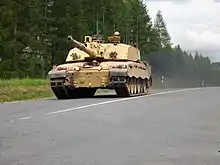2nd Royal Tank Regiment
The 2nd Royal Tank Regiment (2 RTR) was an armoured regiment of the British Army. It was part of the Royal Tank Regiment, itself part of the Royal Armoured Corps and the 1st Mechanized Brigade.
| 2nd Royal Tank Regiment | |
|---|---|
 Cap badge of the Royal Tank Regiment. | |
| Active | 28 July 1917– August 2014 |
| Country | |
| Branch | |
| Type | Armoured |
| Role | Armoured regiment |
| Size | Regiment |
| Part of | Royal Armoured Corps |
| Garrison/HQ | Aliwal Barracks, Tidworth, Wiltshire |
| Motto(s) | Fear Naught |
| Colors | Brown, red and green (Through mud and blood to the green fields beyond) |
| March | Quick: My Boy Willie Slow: The Royal Tank Regiment Slow March |
| Anniversaries | Battle of Cambrai (20 November) |
| Engagements | First World War Second World War |
| Battle honours | Battle Honours |
| Commanders | |
| Colonel-in-Chief | HM The Queen |
| Notable commanders | Hugh Elles Douglas Henry Pratt |
| Insignia | |
| Tactical Recognition Flash | |
History

Founded as B Battalion, Tank Corps in 1917, the 2 RTR first saw action in the First World War with the advent of tank technology. It later fought in the Second World War. In 1992, it merged with the 3rd Royal Tank Regiment, keeping their own original title. It became the second regiment to be equipped with the Challenger 2 in 1998.[1]
Sabre squadrons were deployed by the regiment to Iraq on Operation Telic in 2003 and 2007.[2][3] After a long period in Fallingbostel, Germany, the regiment moved back to Aliwal Barracks in Tidworth in July 2007.[4] On 25 June 2008 at Buckingham Palace, both 1RTR and 2RTR were presented with their new Standard by The Queen, which included the new Battle Honour of Al Basrah 2003.[5]
Units were deployed to Afghanistan on Operation Herrick in 2010.[6]
In August 2014 the regiment merged with 1RTR to form the Royal Tank Regiment. The new regiment is based at Aliwal Barracks in Tidworth and is one of three armoured regiments equipped with the Challenger II tank.[7]
2003 friendly fire incident
In March 2003 Sergeant Steven Roberts of 2 RTR was shot and killed near Basra in an incident of friendly fire. Another soldier in 2 RTR had been attempting to protect Sergeant Roberts from a stone-wielding Iraqi protester that he was struggling with, who also died. An inquest heard that the soldier responsible was not aware that the machine gun used was inaccurate at short ranges. The inquest found that the shooting was an accident and that Roberts died because the Army failed to provide him with Enhanced Combat Body Armour.[8]
Organisation
The Armoured Regiment consisted of 5 Squadrons:[9]
- Nero Squadron - Headquarters and Support
- Cyclops Squadron - Armoured Squadron
- Badger Squadron - Armoured Squadron
- Egypt Squadron - Armoured Squadron
- Falcon Squadron - Armoured Reconnaissance Squadron
Commanding Officers
The Commanding Officers have been:[10]
|
|
References
- "2nd Royal Tank Regiment". British Army units 1945 on. Retrieved 4 May 2014.
- "Badger". Ministry of Defence. Retrieved 4 May 2014.
- "Cyclops". Ministry of Defence. Retrieved 4 May 2014.
- "Agreement reached with Aspire Defence Limited". Ministry of Defence. Retrieved 4 May 2014.
- "House of Commons – Hansard Written Ministerial Statements for 10 Nov 2005 (pt 1)". Parliamentary Debates (Hansard). House of Commons. 10 November 2005. col. 21WS–22WS.
- "Egypt". Ministry of Defence. Retrieved 4 May 2014.
- Regular Army basing announcement Archived 2016-08-14 at the Wayback Machine
- "Bureaucratic delay resulted in soldier's death". The Guardian. Press Association. 18 December 2006. ISSN 0261-3077. Retrieved 5 March 2023.
- "2nd Royal Tank Regiment Today". 13 October 2008. Archived from the original on 13 October 2008. Retrieved 20 October 2018.
- "Regiments and Commanding Officers, 1960 - Colin Mackie" (PDF). p. 31. Retrieved 4 February 2021.
External links
- Official site
- 3RTR – Armoured Farmers
- RTR Website
- British Army Locations from 1945 British Army Locations from 1945.
- Merseyside RTR (Brian Gills website)